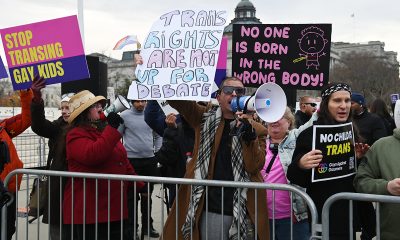News
Post-DOMA rule proposed for hospice care, nursing homes
Administration seeks to ensure same-sex marriages recognized regardless of state of residence


The Centers for Medicare & Medicaid has proposed a new rule for hospice care and nursing homes. (Image public domain).
The Obama administration on Thursday announced a proposed rule that aims to ensure medical care for individuals in same-sex marriages — regardless of the state in which they live — following the Supreme Court decision against the Defense of Marriage Act.
The Centers for Medicare & Medicaid proposes the rule to change conditions for medical care providers and suppliers receiving support from Medicare and Medicaid, including hospitals and hospice care, as well as the requirements for long-term care facilities, or nursing homes.
The thrust of the proposed rule is to ensure same-sex marriages are recognized nationwide, even in states without marriage equality, for programs that in some aspects are administered by the states.
“This proposed rule addresses certain regulations governing Medicare and Medicaid participating providers and suppliers where current regulations look to state law in a matter that implicates (or may implicate) a marital relationship,” the rule states. “Our goal is to provide equal treatment to spouses, regardless of their sex, whenever the marriage was valid in the jurisdiction in which it was entered into, without regard to whether the marriage is also recognized in the state of residence or the jurisdiction in which the health care provider or supplier is located, and where the Medicare program explicitly or impliedly provides for specific treatment of spouses.”
The proposed rule, which can found here, is set for publication in the Federal Register on Friday. Once it’s published, comments must be received by 60 days to be assured consideration before the rule is made final.
Karen Loewy, senior attorney and seniors program strategist for the LGBT group Lambda Legal, said the proposed rules are “a very welcome development” and would “amend references to discriminatory state laws to provide equal treatment to spouses.”
“In practical terms, these changes will mean that a patient’s same-sex spouse will have the same right to access information, make decisions, and be part of admissions processes that a different-sex has in hospitals, hospice care, surgical care centers, long term care settings, labs, and community mental health centers that receive Medicare or Medicaid dollars, even when the laws of the state would not recognize their right to do so,” Loewy said. “These rules would provide important automatic protections for same-sex spouses, ensuring that a patient’s spouse gets to be by his or her side, be informed, and make those difficult decisions in vulnerable health care situations.”
In summary, the proposed rule seeks to established a same-sex spouse should be considered a person’s representative — regardless of state law — for the purposes for care from ambulatory surgical centers, hospice care, exercising a patient’s rights, informing patients of their rights, notification for laboratory services to screen blood and blood products for potentially infectious diseases like HIV and Hepatitis C, care in long-term facilities, pre-admission screening and resident review for long-term care, findings of these evaluations, care in Community Mental Health Centers and client rights at these facilities.
Mark Daley, a spokesperson for the National LGBTQ Task Force, said changes in proposed rule are “common-sense” and would help elders in the LGBT community ensure they receive equal care in medical facilities.
“These new policies help ensure that one of the most vulnerable populations in our country, LGBTQ elders, are able to access federal programs in the same way that non-LGBTQ people access programs,” Daley said. “This means ensuring that same-sex spouses will be treated exactly the same as different-sex spouses in programs like long-term care facilities, Hospice care, and hospitals. What this really means for LGBTQ folks is that same-sex spouses will be able to visit and make medical decisions on behalf of their spouse, just like different-sex couples. It means that LGBTQ elders will have legal rights in the health care context, regardless of whether your state continues to discriminate against you by refusing to recognize your marriage.”
After the Supreme Court decision against DOMA, the Centers for Medicare & Medicaid already issued guidance — once in September 2013 and again in May 2014 — to ensure same-sex marriages are recognized in determining eligibility for Medicaid and the Children’s Health Insurance Program. But the proposed rule says it’s needed because policies it addresses “are administered by different statutes and are administered by state Medicaid agencies and CMS.”
Sarah Warbelow, legal director for the Human Rights Campaign, said the proposed rule will help individuals in same-sex marriages in the medical care situations when they need assistance the most.
“When people are at their most vulnerable, from hospitals to hospice care to nursing homes, they need to know that their spouse will be fully informed, be able to help them make decisions, and be fully regarded as their spouse,” Warbelow said. “The rule proposed by the Centers for Medicare and Medicaid will help to ensure that the marriages of same-sex couples are treated equally regardless of where the couple lives.”
District of Columbia
Gay ANC member announces candidacy for Ward 1 D.C. Council seat
Community leader Brian Footer seeking seat held by Brianne Nadeau

Gay Advisory Neighborhood Commissioner Brian Footer, a community activist who has been involved for many years in local and national government affairs, has announced his candidacy for the Ward 1 D.C. Council seat up for election in 2026.
Footer, a Democrat, will be running in the city’s June 2, 2026, Democratic primary for the Ward 1 Council seat, but it is uncertain whether he will be running against incumbent Ward 1 Council member Brianne Nadeau (D). Nadeau has not yet announced if she plans to run for re-election for a fourth term following her 12 years on the Council.
Nadeau has been a longtime vocal supporter of the LGBTQ community.
If Footer were to win the primary and the November 2026 general election, he would become the Council’s second openly gay member. Ward 5 Council member Zachary Parker (D) is currently the 13-member Council’s only gay member.
Footer is a three-term ANC commissioner who currently serves as Chair of ANC 1E, which represents the city’s Adams Morgan neighborhood.
“Brian has worked at every level of government — federal, state, and local — building a career rooted in public service, aging policy, and inclusive urban planning,” a statement on his campaign website says.
“I’m running for Council because too many people in Ward 1 are doing everything right and still feel ignored by the city they call home,” Footer states on his website.
“I’m running because we can do better,” his statement continues. “That means making housing more affordable, addressing homelessness with real solutions, and keeping our neighborhoods safe with smart, community focused strategies.”
When contacted by the Washington Blade for comment, Nadeau said she was not ready at this time to discuss her plans about running again or about Footer’s candidacy.
“The primary is a ways away, and I’m very focused right now on the budget and the stadium deal and all the work that we’re doing at the Council,” she told the Blade. “So, I really haven’t had time to turn to my plans. So, as a result, I’m also not going to be commenting on anybody else who is determined that they’re running at this time.”
She first won election to the Council in 2014 after she defeated four-term gay Ward 1 Council member Jim Graham in the Democratic primary after Graham became embroiled in an ethics controversy.
In the 2022 Democratic primary Nadeau defeated gay challenger Salah Czapary in a three-candidate race, by a margin of 48.5% of the vote compared to Czapary’s 30.9%.
With the third candidate, Sabel Harris, receiving 20.4%, the outcome showed that the two challengers had a combined total vote count higher than Nadeau.
Further details of Footer’s candidacy can be accessed from his campaign website, brianfooterdc.com.
Spain
Spanish women detail abuses suffered in Franco-era institutions
Barcelona-based photographer Luca Gaetano Pira created ‘Las Descarriadas’ exhibit

A Barcelona-based photographer, audiovisual artist, and activist has created an exhibit that profiles Spanish women who suffered abuse in institutions that Gen. Francisco Franco’s dictatorship established.
Luca Gaetano Pira, who is originally from Italy, spoke with women who the regime, which governed Spain from 1936-1975, sent to Women’s Protection Board institutions.
The regime in 1941 created the board the country’s Justice Ministry oversaw.
Franco named his wife, Carmen Polo, as the board’s honorary president. Then-Prime Minister Felipe González fully dissolved the board in 1985, a decade after Franco’s death.
Gaetano’s exhibit is called “Las Descarriadas” or “The Misguided Women” in English.
“These are women who were detained between 1941 and 1985 for reasons that are unthinkable today: being lesbian, poor, pregnant out of wedlock, rebellious, politically active … or simply considered ‘morally suspect,'” Gaetano noted to the Washington Blade.
Groups affiliated with the Spanish Catholic Church ran these institutions. Gaetano pointed out they were “presented as social assistance centers.”
“In reality, they were spaces of punishment and forced reeducation, where isolation, unpaid work, and psychological violence were the norm,” he said. “Many of the survivors are still alive. Their testimonies are powerful, urgent, and of extraordinary current relevance.”
The regime sent more than 40,000 women to Women’s Protection Board institutions.
“Despite its seemingly benevolent name, it was in fact one of the most powerful instruments of moral and social control over women during and after the dictatorship,” notes the exhibit. “Under the guise of care and re-education, this institution functioned as a repressive apparatus that punished women who deviated from the ideal feminine model imposed by Franco’s regime: submissive, obedient, married, and dedicated to motherhood within the Catholic family structure.”
The Spanish Catholic Church last month issued a public apology, but Gaetano described it as “very soft” and noted “the women did not accept it.” Gaetano also compared the Women’s Protection Board institutions to Ireland’s Magdalene Laundries.
The Associated Press notes tens of thousands of “fallen” women were sent to the laundries that Catholic nuns operated in Ireland from the 18th century until the mid-1990s. Then-Irish Prime Minister Edna Kenny in 2013 issued a formal apology for the abuses that women suffered in the laundries and announced the government would compensate them.
The Spanish government has yet to offer compensation to the women abused in Women’s Protection Board institutions.
“My work focuses on recovering the historical memory of marginalized communities, particularly through the portrayal of survivors of institutional violence and the use of archival materials,” Gaetano told the Blade, noting he has also sought to highlight the repression that LGBTQ people suffered during dictatorships in Portugal and Latin America.
Gaetano’s exhibit can be found here:
District of Columbia
Gay GOP group hosts Ernst, 3 House members — all of whom oppose Equality Act
Log Cabin, congressional guest speakers mum on June 25 event

U.S. Sen. Joni Ernst (R-Iowa) and three women Republican members of the U.S. House appeared as guest speakers at the June 25 meeting of Log Cabin Republicans of D.C., the local chapter of the national LGBTQ Republican group with that same name.
The U.S. House members who joined Ernst as guest speakers at the Log Cabin meeting were Celeste Maloy (R-Utah), Kat Cammack (R-Fla.), and Julia Letlow (R-La.).
Neither D.C. Log Cabin Republicans President Andrew Minik nor spokespersons for Ernst or the three congresswomen immediately responded to a request by the Washington Blade for comment on the GOP lawmakers’ appearance at an LGBTQ GOP group’s meeting.
“Please join us for an inspiring evening as we celebrate and recognize the bold leadership and accomplishments of Republican women in Congress,” a D.C Log Cabin announcement sent to its members states.
“This month’s meeting will highlight the efforts of the Republican Women’s Caucus and explore key issues such as the Protection of Women and Girls In Sports Act and the broader fight to preserve women’s spaces in society,” the message says.
It was referring to legislation pending in Congress calling for banning transgender women from participating in women’s sports events.
According to media reports, Ernst and the three congresswomen have expressed opposition to the Equality Act, the longstanding bill pending in Congress calling for prohibiting discrimination based on sexual orientation and gender identity in the areas of employment, housing, and public accommodations.
The Log Cabin announcement says the meeting was scheduled to take place at the Royal Sands Social Club, which is a restaurant and bar at 26 N St., S.E. in the city’s Navy Yard area.
D.C. Log Cabin member Stuart West, who attended the meeting, confirmed that Ernst and the three congresswomen showed up and spoke at the event.
“It was a good turnout,” he said. “I would definitely say probably 30 or 40 people attended.” West added, “Four women came to talk to a group of mostly gay men. That’s something you don’t see very often.”
-

 Federal Government2 days ago
Federal Government2 days agoTreasury Department has a gay secretary but LGBTQ staff are under siege
-

 Virginia3 days ago
Virginia3 days agoDefying trends, new LGBTQ center opens in rural Winchester, Va.
-

 District of Columbia2 days ago
District of Columbia2 days agoGay GOP group hosts Ernst, 3 House members — all of whom oppose Equality Act
-

 Opinions4 days ago
Opinions4 days agoUSAID’s demise: America’s global betrayal of trust with LGBTQ people










